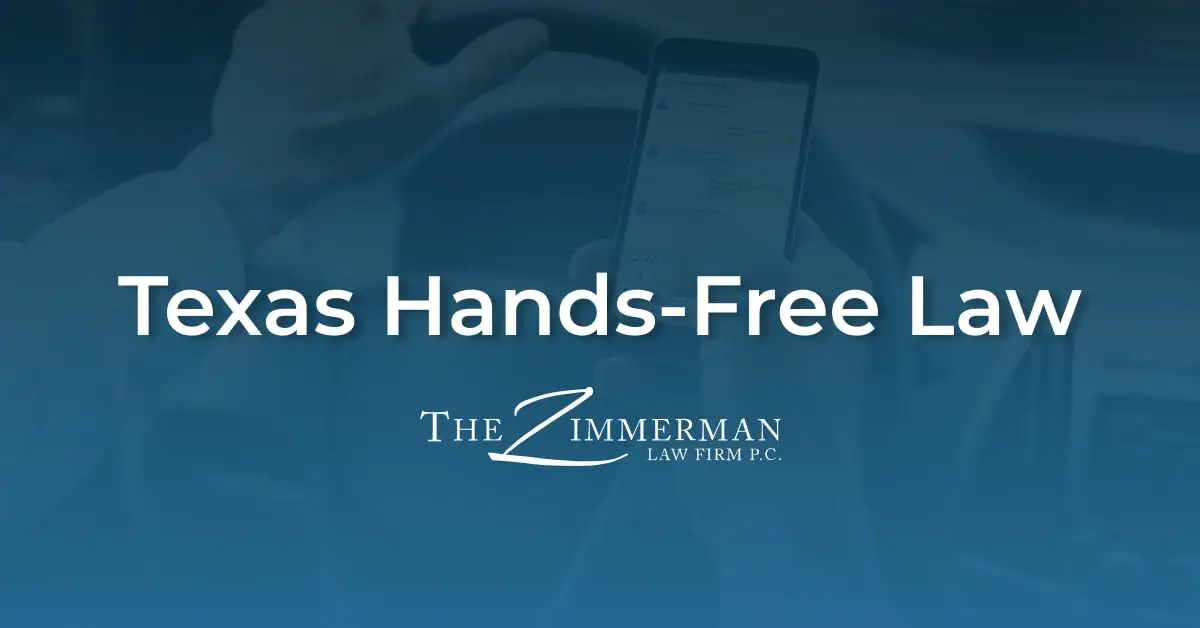 Car Accidents
Car Accidents
Distracting driving can be a big problem, though it is difficult to track how many incidents are distracted driving-related.
In the U.S. in 2018, over 2,800 people were killed and an estimated 400,000 were injured in crashes involving a distracted driver.
Distracted driving is anything that diverts the attention of the driver from the road. New cell phone laws in Texas have been structured to minimize the risk of distracted driving across the state.
What Is the Texas Hands-Free Law 2017?
Most states now have some form of a hands-free law. In accordance with Texas law, drivers must utilize hands-free technology when using their phones while driving. This includes Bluetooth headsets or speakerphones, allowing drivers to keep their hands on the wheel and maintain focus on the road while making calls or sending messages.
It is against the law to text, email, tweet, or post while operating a motor vehicle.
The penalty for texting while driving is a $99 fine for the first offense, and any subsequent violation will result in a $200 fine.
Fines can increase substantially if the driver causes an accident while distracted driving.
New Cell Phone Law
Texting and driving in Texas has been illegal since 2017 according to Texas Transportation Code Section 545.4251, but the use of a cell phone is not completely prohibited.
Many people use their cell phones for navigation or to play music while driving, as well as for making phone calls.
Here are some important Texas cell phone driving laws that you should know.
Texting While Driving
You cannot send or receive text messages while driving in Texas, however, you can use your navigation system. If a law enforcement officer suspects that you are texting while driving, they can pull you over.
Therefore, it is best to have all of your navigation and music set before putting the vehicle in motion.
New Drivers
New Texas drivers may not use cell phones at all. This law extends for the first six months of driving and includes all forms of cell phone use.
Statistics show that the highest percentage of distracted drivers are in the 15 to 19-year-old age range.
Drivers Under 18
After the six-month probationary period, cell phones can be used. Hand-held devices are not allowed until a driver is over the age of 18. All cell phone use must be hands-free in Texas until then.
School Zones
Using a handheld device while driving in a school zone or on public school property is prohibited when reduced speeds are in effect.
School Bus Drivers
If children are present on the bus, the school bus driver may not use a cell phone at all. A bus full of children is distracting enough on its own.
Texas Cell Phone Driving Law Exception
Using a cell phone during an emergency situation will not cause a driver to be fined. A driver may also use their cell phone to contact law enforcement.
Despite the exception, the best practice is to pull off the road before placing the call.
Is it illegal to hold a phone while driving in Texas?
In Texas, holding a phone while driving is generally illegal in certain areas and circumstances. Texas law bans the use of handheld devices in school zones, and drivers under 18 cannot use any mobile devices while driving. For adult drivers, hands-free options are allowed, but holding a phone while driving is discouraged for safety.
Is Texas a Hands-Free State?
Texas does not have a complete hands-free law, but using a phone while driving is restricted. Drivers must use hands-free technology (like Bluetooth) for calls or messaging. Holding a phone while driving in certain areas, such as school zones, is illegal
Is Texting and Driving Illegal in Texas?
Texas made texting while driving illegal on September 1, 2017. The law prohibits drivers from using a smartphone to read, write, or engage in any activity while driving.
Hurt by a Driver Ignoring the Hands-Free Law in Texas? Contact a Car Accident Lawyer Today!
Injuries caused by a distracted driver disobeying the new Texas cell phone driving laws are compensable. Every driver has the duty to drive with care and obey the laws.
Texas is an “at-fault” state, meaning the at-fault driver (or their insurance company) is financially responsible for compensating the injured party.
The specifics of your accident and your legal representation can have a huge impact on your personal injury settlement.
The car accident lawyers at Zimmerman Law Firm understand the importance of conducting a comprehensive investigation of your accident and careful documentation of your claim.
We can help you understand what your claim is worth and will negotiate to get you everything you deserve. Contact us to schedule your free case review.
Where You Can Find Our Waco Office Location



